

How Data Can Help You Land Top Talent. Tech founders know that landing top-notch talent is key to their businesses.
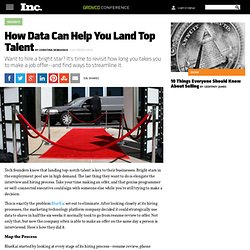
Bright stars in the employment pool are in high demand. The last thing they want to do is elongate the interview and hiring process. Take your time making an offer, and that genius programmer or well-connected executive could sign with someone else while you're still trying to make a decision. This is exactly the problem BlueKai set out to eliminate. After looking closely at its hiring processes, the marketing technology platform company decided it could strategically use data to shave in half the six weeks it normally took to go from resume review to offer. Recruiting: 8 Qualities Your Best Employees Should Have. Great employees are reliable, dependable, proactive, diligent, great leaders and great followers... they possess a wide range of easily-defined—but hard to find—qualities.

A few hit the next level. Some employees are remarkable, possessing qualities that may not appear on performance appraisals but nonetheless make a major impact on performance. Here are eight qualities of remarkable employees: 1. They ignore job descriptions. When Hiring Graduates, Avoid These Mistakes - Tom Moore and Brandon Labman. By Tom Moore and Brandon Labman | 9:28 AM May 3, 2011.
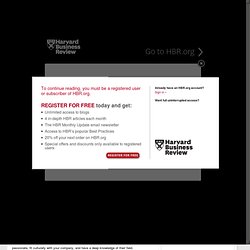
Get Ready for the New Workforce - Ron Ashkenas. By Ron Ashkenas | 10:00 AM December 28, 2012 I recently heard a stunning statistic: For the next 19 years, 10,000 people per day will turn 65 years old, and (presumably) retire shortly thereafter.
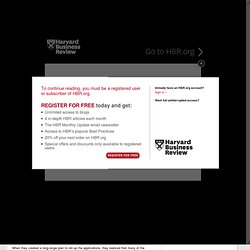
While this graying of the Boomer generation certainly has implications for health care and social policy (and for me personally, as one of those eventual retirees), it may have even more significance for the nature of the workforce and the job of the manager. First, there will be a shortage of workers for key jobs. Susan Cain: The power of introverts. How Introverts Can Become Better Innovators - Francesca Gino - HBS Faculty. By Francesca Gino | 11:33 AM April 20, 2012 Whether you are trying to create a new product, solve problems more effectively, become the most successful company in your industry, or find creative ways to meet your customers’ needs, innovation is likely one of your most critical objectives at work.

The Fortunes Of Solitude: Susan Cain On Introverts, The "New Groupthink," And The Problems With Brainstorming. Bill Gates, Craig Newmark, and Mark Zuckerberg have more in common than being highly successful founders of tech companies.
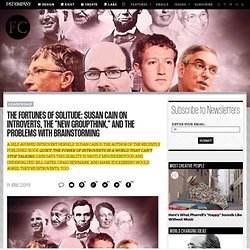
Baby Boomers, Millennials Clash in Workplaces Around U.S. A new poll reveals just how different Gen Y workers are from their Baby Boomer forefathers.
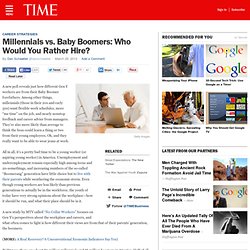
Among other things, millennials (those in their 20s and early 30s) want flexible work schedules, more “me time” on the job, and nearly nonstop feedback and career advice from managers. They’re also more likely than average to think the boss could learn a thing or two from their young employees. Disruptive Demographics in the Workplace: New Strategies for an Aging Workforce. The past four decades have seen major transformation in the roles and evolving responsibilities of employers with regard to the lives of their employees.
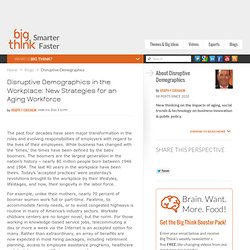
While business has changed with the ‘times,’ the times have been defined by the baby boomers. The boomers are the largest generation in the nation’s history – nearly 80 million people born between 1946 and 1964. The Grass Isn't Greener. Not long ago the CEO of a company we know convened his top executives and asked them to look for new strategic growth opportunities, because revenue had stalled and the existing customer base was shrinking.
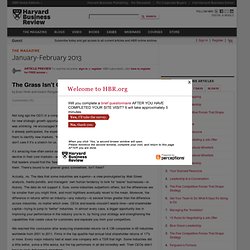
He encouraged them not to be bound by the company’s history, the markets in which it already participated, the expertise of its people, or the assets it had in place. Instead he wanted them to identify new markets. Accelerate! Perhaps the greatest challenge business leaders face today is how to stay competitive amid constant turbulence and disruption.
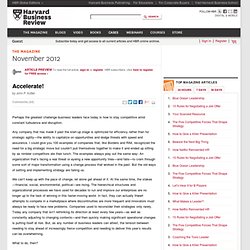
Any company that has made it past the start-up stage is optimized for efficiency rather than for strategic agility—the ability to capitalize on opportunities and dodge threats with speed and assurance. I could give you 100 examples of companies that, like Borders and RIM, recognized the need for a big strategic move but couldn’t pull themselves together to make it and ended up sitting by as nimbler competitors ate their lunch. The examples always play out the same way: An organization that’s facing a real threat or eyeing a new opportunity tries—and fails—to cram through some sort of major transformation using a change process that worked in the past.
But the old ways of setting and implementing strategy are failing us. The Challenge of the Average Employee - Anthony Tjan. By Anthony K. Tjan | 9:13 AM October 4, 2011. Big Data Rears Its Head, And It's Beautiful. What's the Big Idea? As 80 percent of all humans own some sort of mobile phone, the amount of data we are creating is exploding. This so-called data exhaust can be just that -- exhaust and noise -- but it can also be collected and analysed, and then utilized as one of the most powerful assets in the 21st century economy. That's the view of tech giants such as Google, Facebook, Twitter and Amazon, and organizations such as the World Economic Forum. Big Data is becoming as powerful an asset as oil, and it will be the source of many high quality jobs in the near future. The social economy: Unlocking value and productivity through social technologies. In a few short years, social technologies have given social interactions the speed and scale of the Internet.
Whether discussing consumer products or organizing political movements, people around the world constantly use social-media platforms to seek and share information. Companies use them to reach consumers in new ways too; by tapping into these conversations, organizations can generate richer insights and create precisely targeted messages and offers. While 72 percent of companies use social technologies in some way, very few are anywhere near to achieving the full potential benefit. In fact, the most powerful applications of social technologies in the global economy are largely untapped. Companies will go on developing ways to reach consumers through social technologies and gathering insights for product development, marketing, and customer service. Big data: The next frontier for innovation, competition, and productivity. The amount of data in our world has been exploding, and analyzing large data sets—so-called big data—will become a key basis of competition, underpinning new waves of productivity growth, innovation, and consumer surplus, according to research by MGI and McKinsey's Business Technology Office.
Leaders in every sector will have to grapple with the implications of big data, not just a few data-oriented managers. The increasing volume and detail of information captured by enterprises, the rise of multimedia, social media, and the Internet of Things will fuel exponential growth in data for the foreseeable future. MGI studied big data in five domains—healthcare in the United States, the public sector in Europe, retail in the United States, and manufacturing and personal-location data globally. Big data can generate value in each. For example, a retailer using big data to the full could increase its operating margin by more than 60 percent. The Death Of Big Data. Who's Really Using Big Data - Paul Barth and Randy Bean. By Paul Barth and Randy Bean | 11:00 AM September 12, 2012 We recently surveyed executives at Fortune 1000 companies and large government agencies about where they stand on Big Data: what initiatives they have planned, who’s leading the charge, and how well equipped they are to exploit the opportunities Big Data presents.
We’re still digging through the data — but we did come away with three high-level takeaways. First, the people we surveyed have high hopes for what they can get out of advanced analytics. Second, it’s early days for most of them. Hans Rosling: Global population growth, box by box. How Companies Must Adapt for an Aging Workforce - David Bloom and David Canning. By David Bloom and David Canning | 9:00 AM December 3, 2012. Hans Rosling: Stats that reshape your world-view. Hans Rosling's 200 Countries, 200 Years, 4 Minutes - The Joy of Stats - BBC Four.
Gapminder: Unveiling the beauty of statistics for a fact based world view. - Gapminder.org. When Women Leave the Workforce, Think of Those Left Behind - Karen Firestone. By Karen Firestone | 10:00 AM November 28, 2012 As a 56-year-old investment manager and mother of four grown children, I read many articles about the issues facing women with demanding careers as well as families, such as Anne-Marie Slaughter’s article in The Atlantic and the Wall Street Journal piece about the lack of women in finance, assessing how closely the experience described mirrors my own.
While most of these pieces explain how the pressure from competing forces results in many women leaving the workforce, they fail to mention a very significant issue: the impact on those of us who remain behind. Ken Robinson says schools kill creativity. RSA Animate - Drive: The surprising truth about what motivates us. Technology Is Changing How Students Learn, Teachers Say. How to Master a New Skill - Amy Gallo - Best Practices. 5 Things That Really Smart People Do.
The Science of Incentives, Motivation and Choking. Breakthrough ideas don’t happen overnight. Should Your Next CEO be an Inside Outsider? - Stefan Stern. Daily chart: The outsiders. Academic view: A new philosophy of leadership. 6 Simple Rituals To Reach Your Potential Every Day. It’s Tuesday morning at 8 a.m. Two San Francisco entrepreneurs are pitching their ventures to potential investors today.
Our Measurement Model - The Circumplex. Developed by psychologist Dr. J. Should Your Boss Care About Your Klout Score? - Michael Schrage. By Michael Schrage | 9:00 AM November 27, 2012. Successful Leadership Skills. For too long, we’ve thought of “hard skills” and “soft skills” as mutually exclusive. Who's at Fault for High Gen-Y Turnover? Fatigue Is Your Enemy - Tony Schwartz. How to Hang Onto Your Best & Brightest. Why Your Employees Are Losing Motivation.